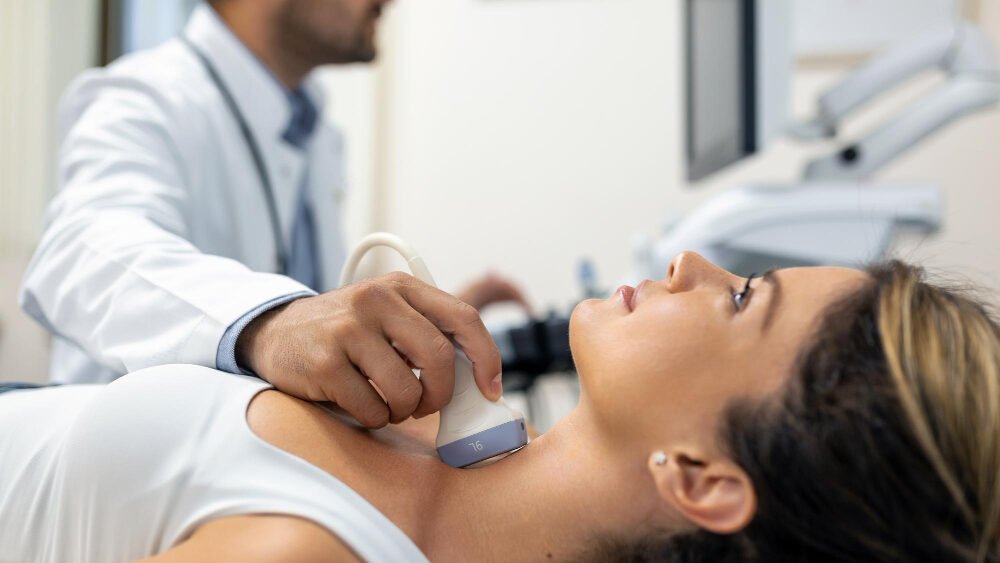Home Methods for Thyroid Health Assessment: Insights and Indicators Also Foods supportive For Thyroid Health

Supporting thyroid health involves maintaining a balanced diet rich in essential nutrients. While it’s crucial to consult with a healthcare professional for personalized advice, here are 20 foods that are generally considered supportive for thyroid function:
- Seaweed (e.g., Nori, Kelp):
- Rich in iodine, a crucial component for thyroid hormone production.
- Brazil Nuts:
- High in selenium, a mineral important for thyroid function.
- Salmon:
- A good source of omega-3 fatty acids, which have anti-inflammatory properties.
- Greek Yogurt:
- Contains iodine and is a good source of protein.
- Eggs:
- Rich in selenium and provide essential amino acids.
- Berries (e.g., Blueberries, Strawberries):
- High in antioxidants, which may help reduce inflammation.
- Spinach:
- Contains iron, which is important for thyroid hormone synthesis.
- Quinoa:
- A good source of protein and contains all nine essential amino acids.
- Chia Seeds:
- Rich in omega-3 fatty acids, fiber, and selenium.
- Lean Turkey:
- Provides protein and zinc, important for thyroid function.
- Beans (e.g., Lentils, Chickpeas):
- Good sources of fiber, iron, and protein.
- Oysters:
- Abundant in zinc, a mineral crucial for thyroid hormone production.
- Pumpkin Seeds:
- Rich in zinc, magnesium, and omega-3 fatty acids.
- Bell Peppers:
- High in vitamin C, which aids in the absorption of non-heme iron.
- Beef:
- A source of iron, zinc, and protein.
- Mushrooms:
- Contain selenium and are rich in antioxidants.
- Sweet Potatoes:
- Provide beta-carotene, which can be converted into vitamin A, important for thyroid health.
- Broccoli:
- Contains compounds that support thyroid hormone production.
- Milk and Dairy Products:
- Good sources of iodine, calcium, and vitamin D.
- Coconut Oil:
- Contains medium-chain fatty acids that may support thyroid health.
Remember, individual dietary needs can vary, and it’s essential to maintain a well-balanced diet. If you have specific concerns about your thyroid health, it’s advisable to consult with a healthcare professional for personalized guidance and recommendations.
Check Thyroids Problem At Home:
Checking thyroid function at home is not as accurate as laboratory testing, but there are certain methods and observations you can use as general indicators. It’s important to note that these home methods should not replace professional medical advice, and if you suspect any issues with your thyroid, it’s recommended to consult with a healthcare professional for proper evaluation. Here are some home methods that may provide general insights:

- Basal Body Temperature:
- Measure your basal body temperature (BBT) using a basal thermometer. The BBT is your body temperature at rest, typically measured in the morning before getting out of bed. A consistently low body temperature may be a sign of hypothyroidism.
- Neck Examination:
- Look for any enlargement or swelling in the neck area, particularly around the thyroid gland. A visible swelling could be a sign of a goiter, which might be associated with thyroid dysfunction.
- Hair and Skin Changes:
- Changes in hair texture, such as increased dryness or thinning, and changes in skin texture may be related to thyroid issues.
- Nail Inspection:
- Brittle or ridged nails may be associated with thyroid problems. Check for any changes in the appearance of your nails.
- Symptom Checklist:
- Keep a record of common symptoms of thyroid issues, including fatigue, weight changes, mood swings, and changes in energy levels. Recognizing patterns may provide additional information.
It’s important to emphasize that these home methods can only offer general indications and are not a substitute for laboratory tests. If you suspect thyroid issues or are experiencing symptoms related to thyroid dysfunction, it’s essential to consult with a healthcare professional for a proper diagnosis. Thyroid function is typically assessed through blood tests that measure thyroid hormone levels, such as TSH (Thyroid Stimulating Hormone), Free T4, and Free T3. These tests provide a more accurate assessment of thyroid function and guide appropriate medical interventions if needed.




